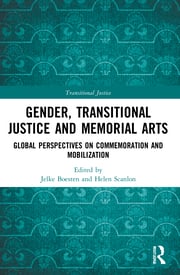
J. Boesten, H. Scanlon (ed.). Gender, Transitional Justice and Memorial Arts. Global Perspectives on Commemoration and Mobilization
Gender, Transitional Justice and Memorial Arts
Global Perspectives on Commemoration and Mobilization
Jelke Boesten, Helen Scanlon (ed.).
ISBN 9781032005072
Routledge
290 Pages
£34.99
PRESENTATION
This book examines the role of post-conflict memorial arts in bringing about gender justice in transitional societies.
Art and post-violence memorialisation are currently widely debated. Scholars of human rights and of commemorative arts discuss the aesthetics and politics not only of sites of commemoration, but of literature, poetry, visual arts and increasingly, film and comics. Art, memory and activism are also increasingly intertwined. But within the literature around post-conflict transitional justice and critical human rights studies, there is little questioning about what memorial arts do for gender justice, how women and men are included and represented, and how this intertwines with other questions of identity and representation, such as race and ethnicity. The book brings together research from scholars around the world who are interested in the gendered dimensions of memory-making in transitional societies. Addressing a global range of cases, including genocide, authoritarianism, civil war, electoral violence and apartheid, they consider not only the gendered commemoration of past violence, but also the possibility of producing counter-narratives that unsettle and challenge established stereotypes.
Aimed at those interested in the fields of transitional justice, memory studies, post-conflict peacebuilding, human rights and gender studies, this book will appeal to academics, researchers and practitioners.
Table of Contents:
1. Introduction: Feminist Understandings of Memorial Arts and Symbolic Reparations
Jelke Boesten and Helen Scanlon
Part I Sites of Commemoration
2. A Feminist Reading of Sites of Commemoration in Peru
Jelke Boesten
3. Gender, Genocide and Memorialisation in Namibia
Penahole Brock and Ester Muinjangue
4. Gender and Memory: Lessons from the Gukurahundi Massacre in Zimbabwe
Nompilo Ndlovu
5. Memory Politics and the Emergence of a Women’s Sphere to Counter Historical Violence in Korea
Seong Nae Kim
6. Calling everything into question: the place of black women in post-1994 South African commemoration
Yvette Hutchison
Part II Arts and Symbolic Reparation
7. Genocide & Epistemicide: Symbolic and Restorative Justice Beyond South Africa’s Truth and Reconciliation Commission
June Bam-Hutchison
8. Do Symbolic Reparations in Brazil Help Women to Escape from Silence and to Transform Their Lives?
Lucia Elena Arantes Ferreira Bastos and Inês Virgínia Prado Soares
9. Fabricating Reconciliation in Canada
Rachel Kerr
10. Women Awake: Gender and Commemoration in Contemporary Ireland
Michelle LeBaron
11. Touching Pain: The Matrixial Experience of Trauma in Works by Doris Salcedo
Margarita Saona
Part III Transformative Gender Justice?
12. Memories of Violence Against Women and Girls across borders: Transformative gender justice through the arts among Brazilian women migrants in London
Cathy McIlwaine
13. Theatre for Transformative Gender Justice: A Comparison of Three Peruvian Plays on Rape during Political Violence
Alexandra Hibbett
14. "The Past is in the Present and Noone Seems Responsible for Putting it There": Gender, Memory And Mobilisation In Post-Apartheid South Africa
Helen Scanlon